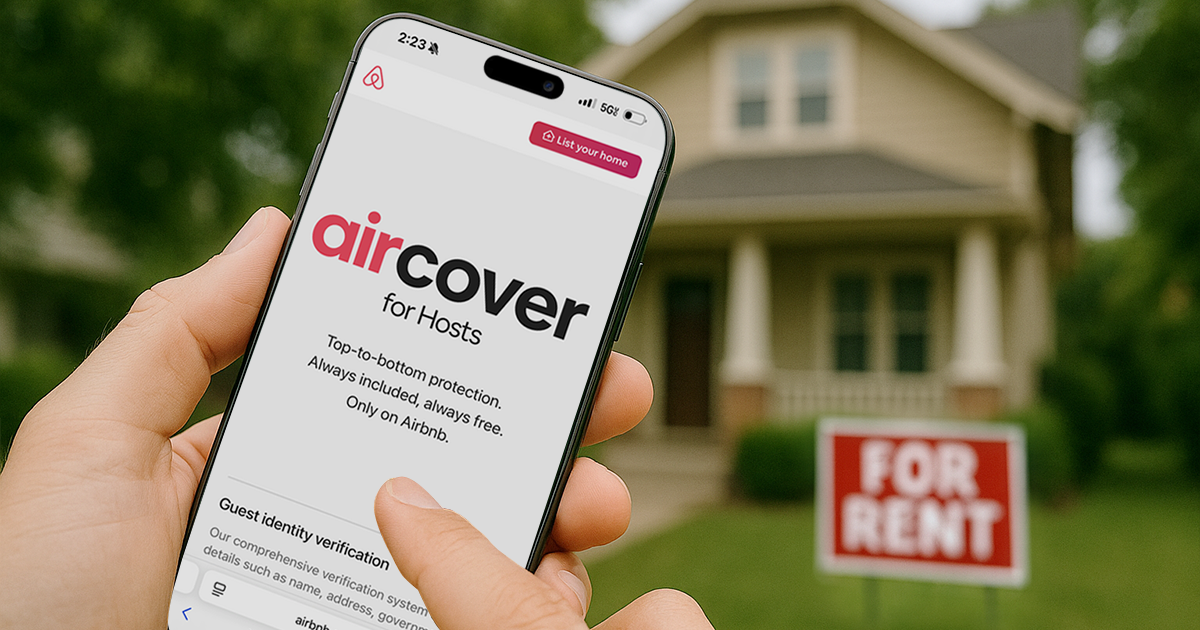If you’re an Airbnb owner, you’ve likely seen the platform promote AirCover as built-in protection for all Airbnb hosts. On paper, it looks generous: free coverage for rental properties, guest damage reimbursement, and liability protection.
But while AirCover can help reduce certain out-of-pocket expenses, it doesn’t go far enough to protect your investment. If you own a short–term rental – or multiple – you'll need landlord insurance to truly safeguard your property from the unpredictability that comes with having renters in your home.
In short, AirCover is not insurance, nor is it a reasonable substitute for an external policy. This guide breaks down what AirCover really covers, what it excludes, and why Airbnb owners need more protection.
What is Airbnb AirCover?
AirCover launched in late 2021 as Airbnb’s replacement for the Host Guarantee program. It was marketed as a major upgrade, designed to reassure Airbnb hosts that they won’t be stuck paying for costly guest damage.
With AirCover, hosts receive:
- $1 million in liability coverage
- $3 million in property damage protection
- Pet damage reimbursement
- Deep cleaning reimbursement
- Limited income loss protection if bookings are canceled due to guest damage
Superhosts also benefit from a fast-track claims process and a 14-day filing window to report damages.
For Airbnb hosts juggling multiple rental properties, this can sound like a lifeline. But as many Airbnb owners learn, AirCover is not a complete solution.
How AirCover helps Airbnb hosts
AirCover does provide useful protection in certain situations:
- If a guest breaks furniture, you may be reimbursed for repairs
- If a guest’s dog damages flooring, you can file a claim for compensation
- If a guest suffers an injury and sues, liability protections may apply
- If damage forces you to cancel bookings, income loss protection may help
For busy Airbnb hosts, this reduces some immediate risks of welcoming guests into an investment property. But AirCover is not insurance, and the gaps matter.
Where AirCover falls short
While AirCover looks like “free insurance,” Airbnb makes it clear that it is not a replacement for a landlord policy. Here’s where it leaves hosts vulnerable:
Limited timeframe of coverage
AirCover only applies when your property is actively booked on Airbnb. If the home sits vacant between stays and suffers storm damage, fire damage, or vandalism, there’s no coverage.
Guest first, Airbnb second
Airbnb requires hosts to first attempt reimbursement directly from the guest before filing a claim. This can mean awkward communication, wasted time, and an uncertain outcome.
Not all damages are covered
AirCover excludes several high-cost risks:
- Theft
- Wear and tear or gradual maintenance issues
- Damage from natural disasters
- Amenities-related losses like pools or hot tubs
For Airbnb owners who advertise amenities to attract bookings, these exclusions create costly gaps.
Filing challenges
Even eligible claims often require extensive documentation and photo evidence. Approval is not guaranteed, and Airbnb has final discretion. This can leave Airbnb hosts without the certainty that landlords need.
Read more: VRBO vs Airbnb: Which is better for landlords?
Why Airbnb owners still need protection
For Airbnb owners, AirCover should be treated as a perk, not a plan. Investment properties are valuable assets, and the financial risks go far beyond AirCover’s limits.
Consider scenarios where AirCover doesn’t apply:
- A storm damages your roof when the property is vacant
- A guest or squatter vandalizes your home outside a booking window
- A lawsuit exceeds the $1 million liability cap
These are everyday risks in rental properties. That’s why many Airbnb owners look beyond AirCover for long-term financial protection.
Airbnb host responsibilities beyond AirCover
AirCover also doesn’t eliminate the obligations Airbnb hosts face under local laws. Cities and states across the U.S. are adding new rules around licensing, safety, and liability.
Recent Airbnb host rule changes highlight how quickly hosting responsibilities can shift. Depending on where your rental is located, compliance requirements may extend well beyond what AirCover provides.
For example, Texas has unique landlord liability standards that could expose Airbnb owners to higher risks. In California, regulations around short-term rentals are strict and evolving. Relying solely on AirCover could leave you unprotected.
Is AirCover enough for investment properties?
AirCover’s $1 million liability cap sounds high, but lawsuits and property claims can easily exceed it. Large homes, multi-unit buildings, or high-value rental properties face far higher potential losses.
For Airbnb hosts who view their rental properties as long-term investments, AirCover is best seen as supplemental coverage. It can offset some minor costs but won’t safeguard a portfolio.
That’s why many Airbnb hosts explore additional options tailored to short-term rentals. To understand your choices, see our guide on Airbnb hosts insurance.
Final thoughts: don’t rely on AirCover alone
Airbnb’s AirCover program is a welcome benefit for Airbnb hosts, helping reduce some risks tied to guest stays. But it doesn’t cover vacant periods, natural disasters, or all forms of damage. Nor does it guarantee reimbursement.
Ultimately, AirCover was designed to keep Airbnb competitive, not to fully protect landlords. For rental property investors, relying on it alone is a risky bet.
At Steadily, we help Airbnb owners and landlords close these coverage gaps. To make sure your rental properties are fully protected, get a fast and affordable quote for landlord insurance today.







.png)
.jpg)
.jpg)


.png)